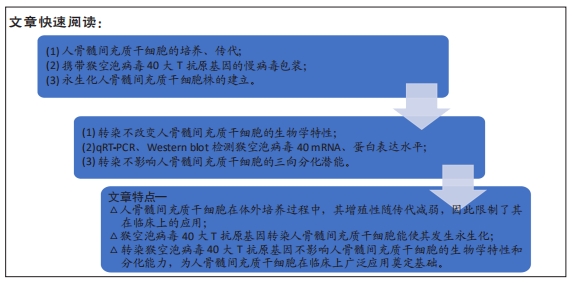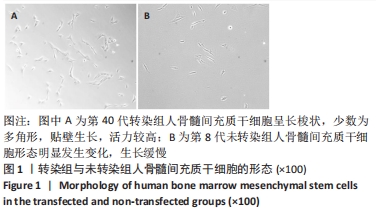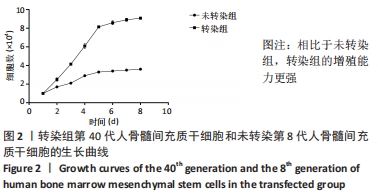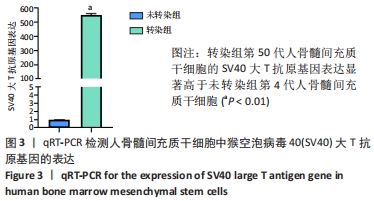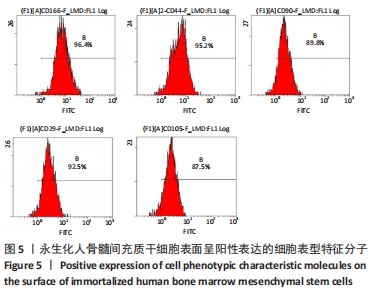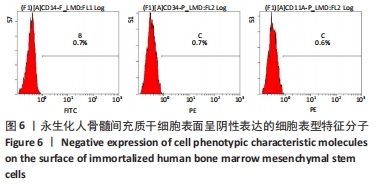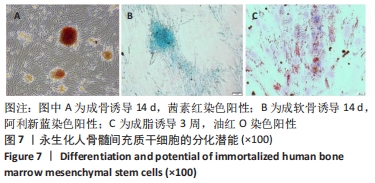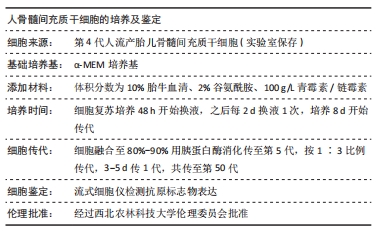[1] 刘勇,刘怡辰.干细胞的种类和特性研究及评价[J].心脏杂志,2012, 24(5):667-668.
[2] BEYER NARDI N, DA SILVA MEIRELLES L. Mesenchymal stem cells: isolation, in vitro expansion and characterization. Handb Exp Pharmacol. 2006;(174): 249-282.
[3] CHEN C, GUDERYON MJ, GE G, et al. Lentiviral Infection of Mouse Bone Marrow Cells for Hematopoietic Stem Cell Transplantation. Methods Mol Biol. 2019;1919:205-213.
[4] BAJEK A, CZERWINSKI M, OLKOWSKA J, et al. Does aging of mesenchymal stem cells limit their potential application in clinical practice? Aging Clin Exp Res. 2012;24(5):404-411.
[5] KRISHNAN M, SHARMA A, SARASWATHY S, et al. Mesenchymal stem cells from orthodontic premolar teeth. Med J Armed Forces India. 2020;76(2): 172-179.
[6] 王斯琪,卢海源,程腊梅. 3种不同组织来源的间充质干细胞促内皮祖细胞血管形成作用的比较[J].中南大学学报(医学版),2018,43(2): 184-191.
[7] 程斌,程海燕.永生化骨髓间充质干细胞模型的构建[J].现代医院, 2015,15(1):13-15.
[8] CHEN Y, YU Q, HU Y, et al. Current Research and Use of Mesenchymal Stem Cells in the Therapy of Autoimmune Diseases. Curr Stem Cell Res Ther. 2019; 14(7):579-582.
[9] 孙思茂,李浩,王笑竹,等.MSCs来源外泌体在脑卒中中的研究进展[J].中风与神经疾病杂志,2019,36(4):362-366.
[10] 刘元媛,曹晓沧.不同生物活性材料对间充质干细胞功能影响的比较[J].天津医科大学学报,2018,24(5):409-414.
[11] 赵丹丹,陶然,刘豫,等.bFGF对hBMSCs增殖及成软骨能力影响的实验研究[J].组织工程与重建外科杂志,2017,13(6):318-321.
[12] 陈彤,王鲁宁,王振福.缺血性疾病与认知功能关系的研究[J].脑与神经疾病杂志,2008,16(4):288-290.
[13] 解慧琪,杨志明,屈艺.SV40与细胞永生化[J].中国修复重建外科杂志, 2000,14(3):170-174.
[14] 杨娜娜,王娟,杜立新.细胞永生化的研究进展[J].中国畜牧兽医,2005, 32(1):37-39.
[15] 黄今,杨融辉,马海英.细胞永生化机制及不同细胞永生化方法研究进展[J].东南大学大学学报(医学版), 2015,34(5):821-824.
[16] LIU N, GUO XH, LIU JP, et al. Role of telomerase in the tumour microenvironment. Clin Exp Pharmacol Physiol. 2020;47(3):357-364.
[17] GROSS L. A filterable agent, recovered from Ak leukemic extracts, causing salivary gland carcinomas in C3H mice. Proc Soc Exp Biol Med. 1953;83(2): 414-421.
[18] CHEN Y, HU S, WANG M, et al. Characterization and Establishment of an Immortalized Rabbit Melanocyte Cell Line Using the SV40 Large T Antigen. Int J Mol Sci. 2019;20(19):4874.
[19] SWEET BH, HILLEMAN MR. The vacuolating virus, S.V. 40. Proc Soc Exp Biol Med. 1960;105:420-427.
[20] VOGT M, DULBECCO R. Virus-cell interaction with a tumor-producing virus. Proc Natl Acad Sci U S A. 1960;46(3):365-370.
[21] DAYA-GROSJEAN L, AZZARONE B, MAUNOURY R, et al. SV40 immortalization of adult human mesenchymal cells from neuroretina. Biological, functional and molecular characterization. Int J Cancer. 1984;33(3):319-329.
[22] KAISER B, BÖTTNER M, WEDEL T, et al. Establishment and Characterization of an SV40 Large T Antigen-Transduced Porcine Colonic Epithelial Cell Line. Cells Tissues Organs. 2017;203(5):267-286.
[23] 张翊华,窦忠英,沈文正,等.人胎儿骨髓间充质干细胞分离培养与生物学特性[J].农业生物技术学报,2008,16(3):443-449.
[24] XU G, ZHANG L, REN G, et al. Immunosuppressive properties of cloned bone marrow mesenchymal stem cells. Cell Res. 2007;17(3):240-248.
[25] DENNIS JE, MERRIAM A, AWADALLAH A, et al. A quadripotential mesenchymal progenitor cell isolated from the marrow of an adult mouse. J Bone Miner Res. 1999;14(5):700-709.
[26] 王丽娟,张嫒媛.骨髓间充质干细胞的研究进展[J].赤峰学院学报(自然科学版),2010,26(3):70-72.
[27] RE’EM T, KAMINER-ISRAELI Y, RUVINOV E, et al. Chondrogenesis of hMSC in affinity-bound TGF-beta scaffolds. Biomaterials. 2012;33(3):751-761.
[28] 闫磊,慕晓玲.人骨髓间充质干细胞诱生的细胞对糖尿病大鼠的降糖作用[J].中国医师杂志,2016(z1):36-49.
[29] 付钰,侯韵雯,王羽立,等.HAMSCs/HBMSCs共培养体系在纠正高糖高脂诱导骨损伤中的作用[C].南昌:全国口腔生物医学学术年会,2018.
[30] 刘黎,李多云,周健.自体BMSCs移植治疗肝硬化失代偿期19例临床分析[J].临床内科杂志,2010,27(8):525-527.
[31] WANG Y, CHEN S, YAN Z, et al. A prospect of cell immortalization combined with matrix microenvironmental optimization strategy for tissue engineering and regeneration. Cell Biosci. 2019;9:7.
[32] ZHEN HN, ZHANG X, BU XY, et al. Expression of the simian virus 40 large tumor antigen (Tag) and formation of Tag-p53 and Tag-pRb complexes in human brain tumors. Cancer. 1999;86(10):2124-2132.
[33] 毛德文,裴燕燕,王明刚.大鼠Kupffer细胞分离、培养及永生化实现[J].大众科技,2017,19(12):35-37.
[34] 王佳雯,高云鹏,王敏,等.梅花鹿鹿茸软骨细胞和间充质干细胞永生化细胞株的构建及鉴定[J].科学技术与工程,2017,17(27):138-143.
[35] WANG Y, HU G, HILL RC, et al. Matrix reverses immortalization-mediated stem cell fate determination. Biomaterials. 2021;265:120387.
[36] KUDO Y, HIRAOKA M, KITAGAWA S, et al. Establishment of human cementifying fibroma cell lines by transfection with temperature-sensitive simian virus-40 T-antigen gene and hTERT gene. Bone. 2002;30(5):712-717.
[37] 李盛波,郑勇斌.人脐静脉内皮细胞永生化及生物学特性的研究[J].中华实验外科杂志,2019,36(1):60-62.
[38] FUJII S, MAEDA H, WADA N, et al. Establishing and characterizing human periodontal ligament fibroblasts immortalized by SV40T-antigen and hTERT gene transfer. Cell Tissue Res. 2006;324(1):117-125.
[39] FUJII S, MAEDA H, WADA N, et al. Investigating a clonal human periodontal ligament progenitor/stem cell line in vitro and in vivo. J Cell Physiol. 2008; 215(3):743-749.
[40] PARKAR MH, KURU L, O’HARE M, et al. Retroviral transduction of human periodontal cells with a temperature-sensitive SV40 large T antigen. Arch Oral Biol. 1999;44(10):823-834.
[41] MCNEES AL, HARRIGAL LJ, KELLY A, et al. Viral microRNA effects on persistent infection of human lymphoid cells by polyomavirus SV40. PLoS One. 2018; 13(2):e0192799.
[42] GUO Z, JING R, RAO Q, et al. Immortalized common marmoset (Callithrix jacchus) hepatic progenitor cells possess bipotentiality in vitro and in vivo. Cell Discov. 2018;4:23.
[43] PATIL PB, BEGUM S, JOSHI M, et al. Phenotypic and in vivo functional characterization of immortalized human fetal liver cells. Scand J Gastroenterol. 2014;49(6):705-714.
[44] HUNG CJ, YAO CL, CHENG FC, et al. Establishment of immortalized mesenchymal stromal cells with red fluorescence protein expression for in vivo transplantation and tracing in the rat model with traumatic brain injury. Cytotherapy. 2010;12(4):455-465.
[45] WU X, WANG S, LI M, et al. Conditional reprogramming: next generation cell culture. Acta Pharm Sin B. 2020;10(8):1360-1381.
[46] DOMINICI M, LE BLANC K, MUELLER I, et al. Minimal criteria for defining multipotent mesenchymal stromal cells. The International Society for Cellular Therapy position statement. Cytotherapy. 2006;8(4):315-317.
|
